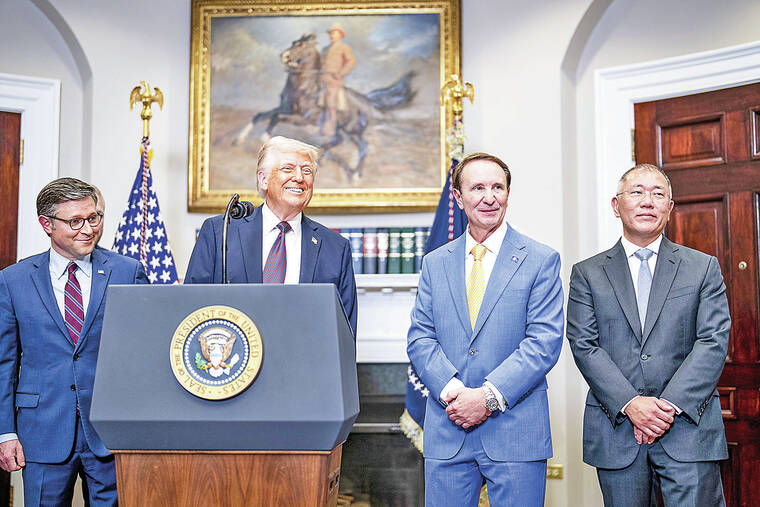Hyundai to invest $21 billion in US in bid to avoid Trump’s tariffs
Hyundai Motor, a South Korean conglomerate known for its automobiles, will invest $21 billion to expand manufacturing in the United States in what President Donald Trump said was proof that his tariff policies were creating jobs.
The company, which also produces steel, said the investment through 2028 would include $6 billion for a steel factory in Louisiana that would employ 1,300 people and for other projects to supply Hyundai factories with parts and materials.
The company will also spend $9 billion to expand production of Hyundai, Kia and Genesis vehicles in the United States. The rest of the money will be used for projects that include expanding supplies of renewable energy, building more electric vehicle chargers, and conducting research on robots and autonomous driving.
“Money is pouring in,” Trump said at the White House in an event that included Louisiana Gov. Jeff Landry and Euisun Chung, executive chair of Hyundai. “This investment is a clear demonstration that tariffs very strongly work.”
Trump has threatened to impose new tariffs on a wide range of foreign goods, including automobiles, and by promising to invest more in the United States, Hyundai may help South Korea avoid tariffs or, at least, be subject to lower duties than other countries.
Hyundai already has significant investments in the United States. Last year, the company began producing electric vehicles at a factory near Savannah, Georgia, that cost $7.6 billion to build. On Wednesday, Hyundai plans to host an event to show off the complex.
Along with SK On, a South Korean battery maker, Hyundai is investing another $5 billion to produce EV batteries near Atlanta.
Chung gave Trump credit for the Georgia investments, saying they were initiated when the president visited Seoul, South Korea, in 2019 during his first term. “We are really proud to stand with you and proud to build the future together,” Chung said.
The Hyundai factories in Georgia also benefited from subsidies passed by Democrats during the Biden administration, although that support was not mentioned at the White House on Monday.
Hyundai also makes vehicles in Montgomery, Alabama. Kia builds cars in West Point, Georgia, southwest of Atlanta.
The factories provide Hyundai with some immunity from tariffs that the Trump administration has imposed or threatened on steel and cars. By reducing Hyundai’s costs from tariffs, the U.S. factories could also give the company a competitive advantage over rivals such as Ford Motor and General Motors, which import many of their electric vehicles from Mexico. Trump has threatened to impose 25% tariffs on products from Canada and Mexico next month.
“There are no tariffs if you make your product in America,” said Trump, who reiterated plans to impose tariffs on imported automobiles in days to come.
This article originally appeared in The New York Times.
© 2025 The New York Times Company





